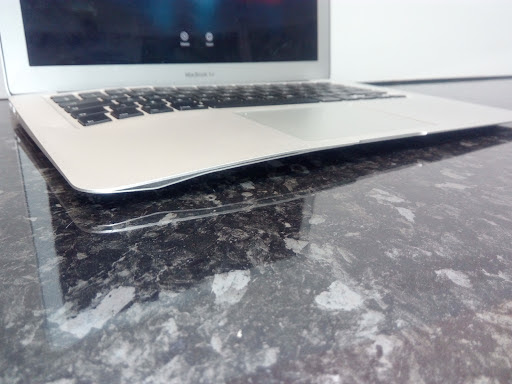Laptops are often valued highly for their portability, leading to another weakness—accidents. Most people take such dents in laptops more as cosmetic ailments, like broken jewelry pieces. However, they can later evolve into a bigger problem. This article will, therefore, discuss the causes of the formation of a dent in your laptop, whether it is safe to use, how to deal with the issue, and how to prevent it.
What Causes a Dent in a Laptop?
Some external factors generally cause dents or depressions on a laptop. Knowing these factors will help you take precautions in the future.
Common Incidents Leading to a Dent
However, anything that causes a drop into the dented area is one of the causes. This could be a drop from a tabletop or a little bump while the notebook was placed into a bag. Either way, even a small fall can cause a horrible cosmetic dent. Not only does dropping cause dents but also improperly placing a sufficiently heavy object on top of a laptop will cause dents.
Accidental Drops and Impact
Even a few inches of drop from a height can dent the exterior shell of your laptop. Although it may appear trivial, the consequences could sometimes damage internal parts, too. Therefore, it is crucial to inspect the computer for functional problems.
Laptop Weight
Occasionally, a dent may result from the weight of your laptop in a compact carry case or under heavy objects. This frequently happens when there is little protection, such as a padded pocket in your bag.
Is It Safe to Use a Laptop with a Dent?
Your laptop may still work even if it has a dent. Still, one must carefully study the circumstances to know whether it is alright to use it.
Functional impact
Though a dent in the laptop’s casing may not immediately impact its operation, it might not. Still, a strong enough dent might cause problems for parts such as the keyboard or screen. Watch your computer. Everything is after the dent—does the screen flicker, or is it overheating? These could be indicators of internal damage.
Possible Risks for Inside Parts
A dent severe enough to puncture the shell would affect the laptop’s internal parts, including the hard drive or cooling system. Internal harm from the dent may cause the laptop to slow, overheat, or crash.
When to Seek Professional Help
If the dent is significant or performance problems are noted, professional help should be sought. A technician can examine the laptop for less obviously apparent damage.
How to Prevent Dents in Your Laptop
Stopping a dent is usually less complicated than fixing one after the fact. The following is some advice for protecting your laptop from dents.
Proper Storage and Handling Tips
Keep your laptop under your protection at all times. When not in use, keep it in a judicious place. Directly or indirectly hitting hard objects on the laptop causes heat expulsion and increases the fear of a crack.
Using Laptop Cases and Covers
A padded laptop sleeve or case is among the more effective ways to avoid dents. This offers additional protection from drops and blows, as dropping the laptop may cause the case to absorb the blow.
Protect Against Drops and Impacts
Consider where you store your laptop. Store it on a level surface and away from tight bags where it could get squished. Frequent travelers may want to buy a strong cover to guard against shocks.
What to Do If Your Laptop Gets a Dent
Do not worry if your computer already has a dent. You can take measures to assess the extent of damage and prevent additional problems.
DIY Solutions for Small Dents
For tiny dents, a hairdryer and gentle cloth can help to heat and press out the dent. Still, this works only for cosmetic damage; if you think there is internal damage, do not try it.
When to Consider Professional Repairs
If the damage is internal or if you are unsure about the dent’s depth, a professional should check the laptop. A technician can gently inspect the computer and fix the damage without causing further damage.
How much is it to repair a dent?
Depending on the seriousness of the dent and any inside damage, repair expenses could differ. While more thorough repairs might go significantly more, basic cosmetic modifications could run anywhere from $50 to $100.
Testing for Internal Damage
Running diagnostics or stress tests will allow you to evaluate your laptop’s performance and detect any failing parts of the system. Look for battery, screen, or CPU performance.
How to Avoid Long-Term Issues
Attending to the problem sooner rather than later is essential if you think there is inner damage. Forgiveness could result in more severe and expensive issues later.
It appears that even a slight dent in your laptop is a minor cosmetic issue, which becomes one to consider seriously and immediately act on. If the damage is superficial, fixing it may just be necessary. If any internal components have been affected, they must be repaired professionally. Remember to keep your laptop in proper storage and good protective cases next time to prevent further damage.
